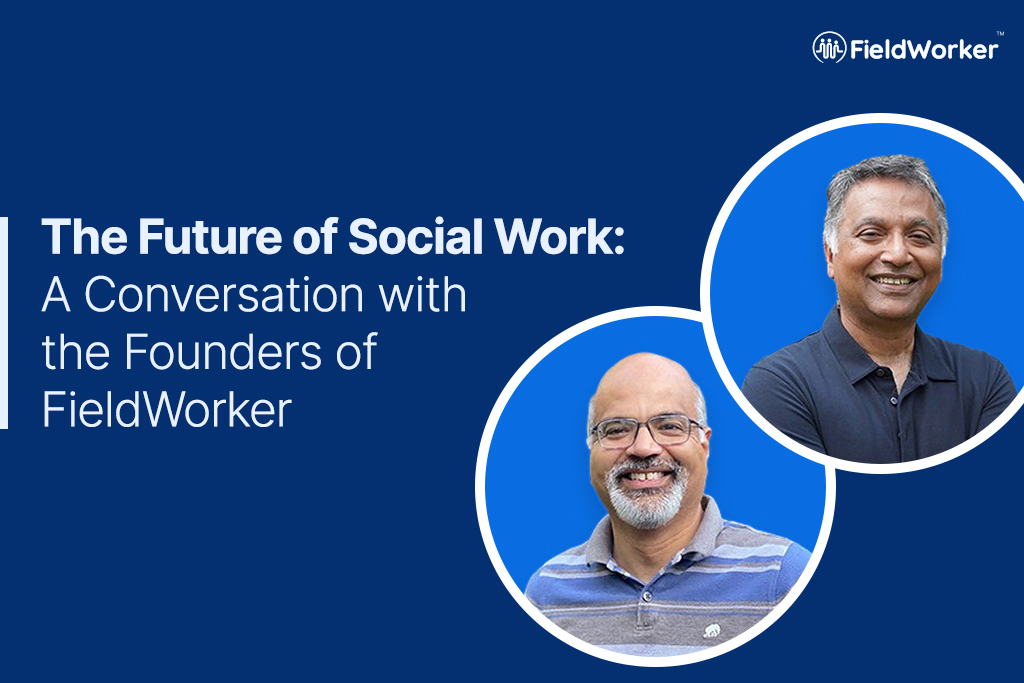Recently, we’ve attended several conferences where the focus has been on one thing: what lies ahead for our industry? After several years of uncertainty and upheaval, it’s now time to look ahead. We sat down with Rohit Mathur and Prabhat Vaish, the founders of FieldWorker, to hear their views on the topic.
A lot of industries – care included – are involving more technology. How do you see the role of tech evolving in this space?
Rohit: High quality care comes down to being able to focus on the needs of patients. This in turn requires space for care providers to dedicate their time to this in the first place. That’s where we see the role of technology as key. Technology should empower care providers to be able to deliver the best care.
Prabhat: Across all industries, technology is completely transforming processes. In healthcare, it creates ways to work more efficiently, and for the purpose to be brought back to the patients.
Rohit: That’s right. There are extremely time-consuming but necessary processes with paperwork, reporting and billing that can be automated with the help of platforms like FieldWorker, also with a higher degree of accuracy. This frees up time for care providers, allowing them to focus their attention firmly on their patients.
Prabhat: Additionally, developments in cloud and mobile technology are actually making it possible to engage in new and easier ways with patients – through remote care and telehealth, for example. Technology doesn’t dehumanize care, it actually opens the doors for more person-centric approaches.
Another massive topic at the minute is the great resignation. People are leaving the field due to burnout, low pay and extreme workloads to name a few reasons. How can platforms such as FieldWorker help tackle these challenges?
Prabhat: We have to emphasize first that burnout is real and debilitating, and needs to be spoken about. And one of the biggest things fuelling burnout is heavy workloads and difficult processes. FieldWorker and other platforms radically simplify tasks, saving employees time and stress and giving them headspace to work on what they are passionate about in the first place: helping people in their communities who need it.
Rohit: With FieldWorker, we’re also helping to speed up payment cycles and make data more accurate. to the business of care providers enabling faster payment cycles and more accurate data. This data connecting the amount of work done compared with wage received will also help organisations lobby agencies on a federal and state level for better financial support and remuneration for care providers.
Of course, our society has historically not placed a premium on the skills required to provide care and has paid a low wage to care providers. This is a fundamental problem that needs to be addressed. As our population ages and the incidence of developmental and mental health diagnoses increases, there’ll be a dire need for more care providers to support everyone.
Prabhat: Another factor contributing to burnout and workload is the amount of regulations in our industry. Regulations are needed to protect workers and patients alike, but in a time where we’re seeing increasing regulatory oversight, it’s becoming increasingly challenging for providers to keep up with the sheer amount of data collection and organization entailed – for example, with EVV recently becoming a requirement in New Jersey.
We’ve designed features within FieldWorker to help make it easier and less time-consuming to collect and organize any required data, and this is something we’ll continue to do in line with changing legislation. Our EVV functionality for example enables care workers to record all data needed for EVV-compliance by just clicking on a “check in” button for a visit. That means 6 pieces of essential information are recorded automatically (and accurately) at the exact time the visit happens.
We’ve seen a firm shift towards community-based care and telehealth over the past for years for obvious reasons. Do you think these trends are here to stay?
Prabhat: Community-based care is very likely to stay with us. That’s the reason why for us, it was important to ensure FieldWorker can support an increasingly mobile workforce. Our platform includes a mobile app, so that workers out delivering care in the community can access all the information they need on the road.
Rohit: I agree, and it’s the same with telehealth. Both received a huge boost during the pandemic out of necessity, and patients have become more comfortable with care delivered in these ways too. These trends are irreversible – there might be some modifications or hybrid models that emerge, but they are here to stay!
Certainly for community-based care, it has proven to be the most effective way to support individuals with IDDs, the elderly, and patients with mental health conditions. It’s possible for patients to stay within their local communities now, and not need to come to centralized institutions.
Like Prabhat said, we’re building FieldWorker with this kind of work in mind. Technology has been a great enabler already in helping care providers go remote and out into the field, and now it needs to continue to adapt and empower them in delivering care in a variety of ways.
We’re always very interested in hearing your views about the future of social care and the role of technology – this helps us ensure FieldWorker delivers in empowering you in the work you do! Connect with us on LinkedIn and Instagram to share your views.
If you want to learn more about the ethos behind FieldWorker, check out this interview with Rohit and Prabhat.
